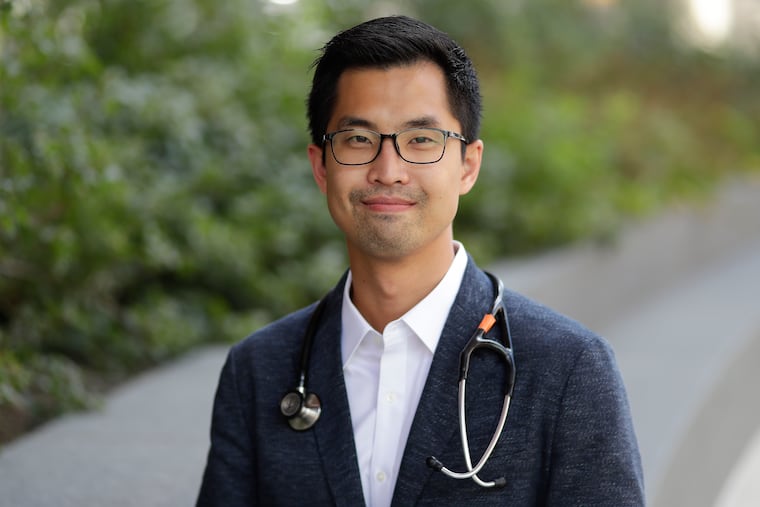Why I stopped believing in ‘putting my head down’ and assimilating as an Asian American | Opinion
Less than 24 hours after I came to the U.S., my name had changed to Jason. I would not come to realize what I lost that day until decades later.

On my first day in the United States, a neighbor came up to me and asked my name. As a 10-year-old who had just arrived from Korea and did not speak any English at the time, I replied timidly: “Ji Seung.”
He initially seemed confused. Then a few seconds later he exclaimed as if he had caught an error.
“Oh, your name is Jason! Nice to meet you.”
» READ MORE: The ‘model minority’ stereotype simplifies Asian American stories like mine | Opinion
Though I noticed a difference, I just smiled and nodded. Back then, I wanted to blend in so much that the option to correct him did not even occur to me. So, less than 24 hours after coming to the United States, I had, without even so much as an objection, let my name be changed to Jason. I would not come to realize what I lost that day until several decades later.
Throughout my young adulthood, this decision became a recurrent theme. I continued to shape my expressions to agree with, rather than to challenge, others’ views. I found it easier to be corrected than to correct others. I avoided sharing stories from my childhood or alluding to anything that would recall my heritage. In college, I distanced myself from any coursework or news related to Korea, letting my grasp of the language and culture atrophy. When I came across issues affecting Asian communities, I remained quiet.
At no point did it occur to me that these choices would be consequential, because I always believed that succeeding as an Asian American in this country meant assimilating to those around me, instead of asking them to change their views and behaviors for me — such as expecting them to simply say my name right. I just put my head down and focused on my future here as Jason, not Ji Seung.
Looking back, however, after having graduated from a prestigious medical school and training to be a cardiac surgeon, I realize that these beliefs were flawed. And that they were not unique to me, but rather represented a leitmotif underlying the Asian American experience in this country. Cast as a model minority, Asian Americans have often been generalized as law-abiding, quiet, and productive people who have collectively come to achieve socioeconomic advancement as a result. These traits have been highlighted and encouraged by society and media, often to oppress other racial groups like Black and Latino Americans that have experienced unique histories of discrimination and have sometimes been more vocal.
Yet Asian Americans are a highly heterogeneous community, with some who have become doctors and lawyers but many with different occupations, and many who remain marginalized. Also, while the term implies that we are doing fine in a post-racial state, we face a long history of discrimination in this country — reaching back to the Chinese Exclusion Act of 1882 and the mass internment of Japanese Americans during World War II — and still need to fight for more assistance and rights.
In the wake of recent shootings in metro Atlanta, where six of the eight victims were women of Asian descent, the ongoing attacks on the Asian American community should be a wake-up call for all of us who for too long believed that the path to success in the United States was quiet assimilation. As racist language during the coronavirus pandemic such as “Kung flu” or “Wuhan virus” has incited more violent crimes and discrimination against Asian Americans — especially toward women and the elderly — it is evident that staying quiet and away from trouble is not, and never was, enough to keep us safe. The 3,795 documented attacks that have taken place over the last year touched us no matter our profession or disposition or immigration status.
I’ve realized it is time for Asian Americans to break outside of the mold of assimilation and to collectively call out acts of discrimination and use of hostile racist language. Our safety as a community does not depend on our being quiet and industrious. We have to be heard.
» READ MORE: My childhood was so tinged with racism I couldn’t even recognize it | Opinion
Even outside of the Asian American community, many who have equated being quiet and industrious with a path toward safety and success may now recognize that the real solution is to be engaged and honest. We have to speak up for one another.
The thought of speaking out on these issues in my immediate community, no matter how glaring, still gives me pause. This moment in time brings me back to my first day when I found it easier to mold my identity than to confront somebody’s mistake.
But as I reflect on what I had really lost the day I became “Jason”— my Korean name and heritage — and how long it has taken to find it again, I want to be a strong voice for those out there who are looking for their places in this society. I want to tell them that fitting in does not mean quietly assimilating. It means being accepted for exactly who we are.
Jason J. Han is a cardiac surgery resident in Philadelphia.
Read more stories of changed minds
Want to write about your own change of mind or heart? Tell us at opinion@inquirer.com.